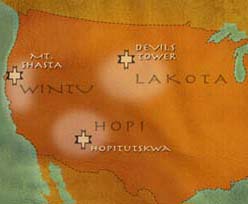 A response to "Primitive" Indian Religion:
A response to "Primitive" Indian Religion: A response to "Primitive" Indian Religion:
A response to "Primitive" Indian Religion:
Native religions good or bad?
The following continues a debate I began with friend Gary on the merits of "primitive" Native religions. The question is whether these religions have been good or bad for Indians:
Gary,
I think you need a better definition of "primitive" than "it's primitive if it holds them back." Holds them back from what, exactly? From being WASP capitalist elitists who can ignore their spiritual beliefs whenever it's convenient? I don't consider power, wealth, or fame to be important. Do you?
Whether religion holds people back depends on their goals in life. If people achieve their goals, we must consider them successful, even if you or I wouldn't feel the same in their place. As I'm sure you know, you can't judge other people by your standards. (Not logically, anyway, unless you can prove your standards are universal.)
By practicing their religions, Native Americans have kept their cultures alive since Columbus's arrival. That's more than most people can say. Where are the conquistadors of the Spanish Empire—or the Empire, for that matter? Where are the Pilgirms and Puritans and the European monarchies that spawned them?
Nowhere, that's where. Yet the Indians are still here. By the standard of remaining strong, unified, and true to their beliefs, Indians haven't been been held back at all. In fact, their religion has been a primary factor in keeping them alive—just as faith sustained many Jews during the Holocaust.
And Indians are still alive and kicking despite our attempts to destroy them. The oldest continuously-inhabited towns in North America are in Indian country (Oraibi and Acoma). From humble beginnings we now have Native Olympic medalists, Pulitzer-Prize winners, and a Senator—all of whom still practice their beliefs, I'll bet. I'd say that deserves respect.
The debate continues (1/3/00)....
Many months later, the debate raged on:
>> Are you sure it's not the casinos instead of their religious beliefs that's helping them survive? <<
Yes, because only something like 5% of the tribes are making money at gambling.
>> I can see why it's impossible for you to prove your qualitative conclusions. When you actually present facts instead of opinions, they tend to contradict your conclusions. <<
Don't think so.
>> Maybe you can explain why such religious people would choose to prosper off of the vices of others. <<
Probably for the same reason Euro-American Christians do it. How many churches have raised funds by staging bingo games, for instance? The reason they do so is because almost everyone in the world bends religious doctrine to real-world necessity. Because religious doctrine is often unrealistically inflexible.
By definition, capitalism means prospering off other people. Are you saying every Christian, Jew, and other religious person in America is immoral? Maybe you want to withdraw the question.
Back to Native religion
>> Your ORIGINAL statement was that today's NA culture has changed less since 1492 than Latino culture. <<
No doubt it was. We've covered much ground since then. My original point was that those Native cultures with the strongest religions have survived better than the contemporaneous Western cultures. The Pueblo cultures (which count as 20 examples, not one) are perhaps the best examples of that.
Steve Russell noted that many Native cultures have been significantly altered or even exterminated. That's true, obviously. There's no way to tell if they changed or disappeared because their religious views were weak, or because they were subject to unbearable forces despite their strong religious views.
If you want to try to "average" the strong cultures that survived with the ones that didn't, I don't know what answer you'll come up with. My answer is that Indian cultures have survived about as well as other cultures around the world. Many have disappeared or changed radically. Those that have survived have done so with strong cultural beliefs, including religious beliefs.
That notion would include the mainstream US culture, of which nine of ten people would say Judeo-Christian principles are the bedrock. If it's true of America in general, why wouldn't it also be true of Indian cultures in America? Strong beliefs help a culture survive.

>> Isn't that the mark of a culture that is too stagnant to survive for long without some kind of parasitic dependence on other cultures. <<
You say "stagnant," I say "rock-solid." Since I don't see things in black and white, I could argue it either way.
>> The real question is whether their religion has helped them to prosper or even just survive. <<
Considering the genocidal depredations we've subjected them to, it's impossible to say how they would've done in "normal" circumstances, without interference. I can only point to some of the longest-lived cultures like ancient Egypt or China. I'd say one reason they survived, even flourished, was by having a strong, unified religious or philosophical base.
Our secular humanist model has survived and flourished for only 224 years so far. I'm hoping, as I'm sure you are, that it will outlast other models and become humanity's default. But that has yet to happen.
Rob:
>> Where are the Puritans and Pilgrims, for starters? <<
Gary:
>> This again? Even your NA friend didn't buy this one. Among a thousand other examples, the Amish alone disprove this ludicrous statement. <<
The American Amish weren't contemporaries of the Indians in 1492, which was central to my original claim. Neither were the Puritans and Pilgrims, but they were the closest contemporaries, arriving a couple of decades later. I could name any number of more recent arrivals who have retained their culture more solidly than most Indians—the Vietnamese or Hmong, for instance. That doesn't challenge my point of comparing cultural survival since 1492.
Indians have done better than Spanish missionaries
Rob:
>> Where are the Spanish missionaries trying to convert the natives to Christ? They've long since vanished, while their Indian counterparts still live. <<
Gary:
>> Yes, the Catholic Church has disappeared off the face of the Earth. <<
The Catholic friars in robes wandering among the Natives to convert them have. Again, I'm comparing like to like. The Catholic Church has survived by evolving over time, just as Indian cultures have. The Church has abandoned practices like burning people at the stake or enslaving Natives for their own good, which were part of its culture in 1492.
Rob:
>> Once again, you've generalized and thereby misstated my specific claim. I carefully limited it to "through the beginning of this century," which predates cars, Levis, and Taco Bells. <<
Gary:
>> Once again, your specific claim proves nothing. You'd have a hard time proving that a single 50-year period demonstrates anything about anything. <<
Check your math on that one. By my tally, 1492 through the beginning of last century is 408 years, not 50.
>> The exception does not prove the rule. If anything, it proves that Pueblo culture is stagnant. <<
Stagnant, if that's what you call it, is better than extinct, which is what the Puritans and Pilgrims and friars and conquistadors are. Not to mention countless countries, kingdoms, and principalities around the world.
To reiterate my argument, Native cultures have survived longer than the US American culture has. I claim that's because of, not in spite of, their religious beliefs.
Postscript
Gary's whole premise, that religion holds people back somehow, is flatly ridiculous. Does he think atheists founded America, built the largest corporations, or put men on the moon? No, most of the accomplishments he considers great were done by card-carrying Christians.
As for Indian who practice their traditional religions, does he think they pray for rain rather than using the latest farming techniques? No, they pray for rain and use the latest farming techniques. Like most people, they tend to believe God helps those who help themselves.
Most people think religion has no direct bearing on science and vice versa. How you pray to God has nothing to do with whether your experiments work or your business flourishes. But psychologically speaking, people who are dedicated and fervent about their beliefs are likely to accomplish more, not less. That's why presidents, generals, and coaches invoke God before sending their people into battle.
Related links
Uncivilized Indians
The "inexcusable" Hopi smothering of eaglets
Should Indians cling to reservations?
More on the alleged superiority of Western civilization over indigenous cultures
|
. . . |

|
All material © copyright its original owners, except where noted.
Original text and pictures © copyright 2007 by Robert Schmidt.
Copyrighted material is posted under the Fair Use provision of the Copyright Act,
which allows copying for nonprofit educational uses including criticism and commentary.
Comments sent to the publisher become the property of Blue Corn Comics
and may be used in other postings without permission.